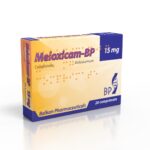Can You Take Tylenol With Meloxicam Together?

Mixing any combination of prescription drugs, over-the-counter drugs can be unpredictable and dangerous. Most fatal overdoses involve the use of more than one type of drug (poly-drug use).
Poly-drug use is dangerous because different drugs act on our bodies in different ways. The harmful effects are magnified by using more than one drug type.
What is Tylenol?
Tylenol also known as acetaminophen is a medication that relieves mild-to-moderate pain, headache and fever. You can use acetaminophen to relieve mild or moderate pain. This is usually pain from colds, sore throats, headaches, body or muscle aches, menstrual cramps, arthritis, or toothaches. You can also use it to reduce fever.
It’s not fully known how acetaminophen works. It doesn’t reduce swelling or inflammation. Instead, it’s thought that it blocks the release of certain chemicals in your brain that signal the sensation of pain.
What is Meloxicam?
Meloxicam is in a class of medications called nonsteroidal anti-inflammatory drugs (NSAIDs). It works by stopping the body’s production of a substance that causes pain, fever, and inflammation.
Meloxicam is used to relieve pain, tenderness, swelling, and stiffness caused by osteoarthritis (arthritis caused by a breakdown of the lining of the joints) and rheumatoid arthritis (arthritis caused by swelling of the lining of the joints). Meloxicam is also used to relieve the pain, tenderness, swelling, and stiffness caused by juvenile rheumatoid arthritis (a type of arthritis that affects children) in children 2 years of age and older.
Can you take Tylenol with meloxicam?
Yes, you can take meloxicam and Tylenol together but medical experts and pharmacologists warn against this practice. The American College of Toxicology recommends that you choose which medication to use and use only that medication unless you completely switch to another. It is important to always read the labeling of over-the-counter medications to avoid taking multiple products containing NSAIDs at the same time.
Always consult with your healthcare provider prior to starting any new medication to ensure that it is safe for you given your health and medication history.
How should I take Tylenol?
Take only one product that contains acetaminophen at a time. Acetaminophen is in many products and you could accidentally take too much if you’re using more than one product at the same time. Acetaminophen can be used by all age groups in recommended doses.
Children (general): The dose of acetaminophen for children is based on body size. Usually, it is calculated as 10 mg to 15 mg per kilogram of body weight, every 4 to 6 hours. No more than 65 mg/kg should be given in a 24-hour period. Children should not take more than 5 doses in 24 hours unless advised by a doctor. For children under 6 months of age, consult a doctor.
Children’s liquid medications should be given using a calibrated dosing device, such as an oral syringe. This ensures that you are giving your child the right amount. Some formulations of liquid acetaminophen contain different concentrations of acetaminophen. Pay careful attention to the concentration on the label and the calculated dose volume.
Adults: The dose of acetaminophen for adults is 325 mg to 650 mg every 4 to 6 hours. Do not take more than 4,000 mg in a 24-hour period. If you are taking the extended-release caplets, the recommended dose for adults and children over 12 years is 1300 mg taken every 8 hours.
Acetaminophen products available without a prescription should not be used for longer than 5 days in a row for pain or 3 days in a row for fever. If you consume 3 or more alcoholic drinks in a day, do not take acetaminophen products, as your risk of liver damage is increased.
Many things can affect the dose of medication that a person needs, such as body weight, other medical conditions, and other medications. If your doctor has recommended a dose different from the ones listed here, do not change the way that you are taking the medication without talking to your doctor. Always take acetaminophen exactly as prescribed by your doctor.
How should meloxicam be used?
Meloxicam comes as a tablet and suspension (liquid) to take by mouth. It is usually taken once a day with or without food. Take meloxicam at the same time every day. Follow the directions on your prescription label carefully, and ask your doctor or pharmacist to explain any part you do not understand.
Rheumatoid arthritis: The usual starting dose of meloxicam to treat the symptoms of rheumatoid arthritis is 15 mg once daily. For some people who may respond well to the medication, their doctor can reduce the dose to 7.5 mg once daily, according to need.
Osteoarthritis: The recommended dose to relieve osteoarthritis pain is 7.5 mg once daily. The doctor may increase this to 15 mg taken once daily if necessary.
For both conditions, the maximum dose of meloxicam is 15 mg taken once daily. This medication may be taken with or without food.
The use of this medication should be limited to the lowest effective dose for the shortest period of time needed.
Many things can affect the dose of medication that a person needs, such as body weight, other medical conditions, and other medications. If your doctor has recommended a dose different from the ones listed here, do not change the way that you are taking the medication without consulting your doctor.
It is important to take this medication exactly as prescribed by your doctor. If you miss a dose, skip the missed dose and continue with your regular dosing schedule. Do not take a double dose to make up for a missed one. If you are not sure what to do after missing a dose, contact your doctor or pharmacist for advice.





